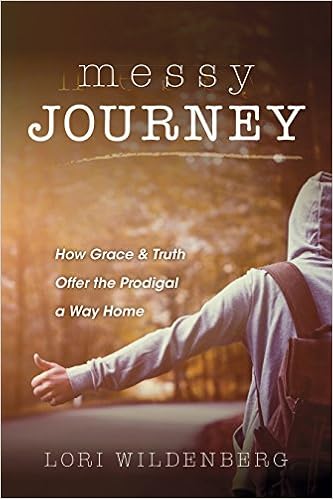
A Way Home for Prodigals

Excerpt taken from Messy Journey: How Grace & Truth Offer the Prodigal a Way Home by Lori Wildenberg
Chapter 7
Find Your Support System
Though one may be overpowered, two can defend themselves. A cord of three strands is not quickly broken.—Ecclesiastes 4:12
It was raining. My dad and mom and my sister and her kids made a mad dash for the car…well, as fast as one can go pushing a stroller with two preschoolers. The Aitkin County Fair in Minnesota had been big fun: clowns, animals, and acrobats. The kids climbed into their car seats, ready to fall asleep on the 20-minute ride back to the cabin.
About six miles from Aitkin and ten miles from the heart of greater downtown Glen (the business district consists of a coin laundry, restaurant, bar, corner store, and garage) the back right tire blew out.
No cell phone reception, a vacant highway, a hidden spare tire, and a dark stormy sky left the three adults wondering what would happen next.
Within a matter of minutes, God sent an angel in the form of a Vietnam veteran who was a mechanic by trade. Thanks to their heaven-sent Good Samaritan, a half an hour later they were back on the road.
We learn pretty fast when we have a child who has stepped off the expected path that helping another in crisis is about two things: showing up and shutting up.
The Good Samaritan who can just be there, listen, offer a hug, validate my emotions, give encouragement, pray when prompted by the Spirit, or maybe even provide a distraction is heaven-sent. A Good Samaritan is not a gossip, Pharisee, or rock thrower.
During these terrible prodigal times, my sensitivity barometer is off the charts. These thoughts have crossed my mind:
“I don’t want to burden anyone.”
“I don’t want my child to be viewed in a bad light.”
“I don’t want to be judged.”
“I don’t want my child to be hurt.”
It’s scary, painful, and embarrassing to admit to having a dysfunctional family. Folks who haven’t gone through the same kind of trauma can’t fully appreciate the vulnerability of those who have.
A couple with a prodigal daughter attended one of my classes for parents with kids on a detour. We went around the group sharing our stories.
“It has been seven years, and I have never spoken of this to anyone. Today is the first time.” His wife’s eyes filled with tears as she listened to her husband. He trusted us, a motley crew of moms and dads, all struggling with living life in a hard, unexpected place.
Their daughter was estranged from them, living with another woman. On the rare occasion when she would phone, she attempted to pit one parent against the other.
They didn’t fall for that. Husband and wife clung to each other and waited with bated breath until the next call, hoping they would hear she was coming home.
This couple was an island unto themselves. Fearing ridicule and rejection they kept quiet about their pain. Had they been in a car accident they wouldn’t hesitate to dial 911 for help or 411 to locate a tow truck. But that is not their trouble—they have a prodigal child. The embarrassment, shame, and the feelings of wanting to protect their child stopped them from asking for help.
During those seven years they would have liked to have had someone to call on in an emergency, for support, or for information. Instead they chose to use the Internet for their information and support.
Grace and Truth
Many families feel that church is the last place they would share their child’s struggle. The desire to protect an image and the fear of rejection all play into the silence. How sad, when church is the first place we should run. The church can rise to the occasion as it did with this community of believers in the story that follows.
We all believed my friend’s daughter, Sarah, would be set free. It was not a topic we discussed with her. The only statement I would make to my friend was, “I’m praying and believing with you.” Everyone was aware of the young woman’s situation, but there was never any small talk or any judgment from the congregation. Now that I think about it, I believe that is why my friend was able to walk with her head held high. She felt no shame for her daughter’s situation because we all stood with her.
Sarah never appeared uncomfortable when visiting our church. To the best of my recollection she went for prayer. We all just loved her. We never condemned her. Perhaps this is why she was free to receive prayer when she came to visit. —Bethany
It is a powerful thing when God’s people stand shoulder-to-shoulder.
One of the support places Tom and I discovered that has biblically sound information, current information, and available counseling is Where Grace Abounds (an organization in Denver for those in conflict with their sexuality and the people who love them).
My hopes were high the first time we walked through those doors.
“We will give this a year. By then she will be fixed. I can do a year.”
That was three years ago.
Sexual brokenness and substance abuse are lifestyles that parents want resolved right away. We pray, God fix this now. I don’t want deal with this anymore.
The staff at Where Grace Abounds has taught me how to move beyond myself and to focus on and trust in God. I’m learning how to speak truth while showing grace. I have hope going into this fourth year. But my prayers are different. They are more bridge-builder prayers. God, change me. Use me. Draw each one of my family members close to You.
When I first went to Where Grace Abounds, I was mad. I didn’t want to go. My mom and dad forced me. But by the third or fourth time, I just fell in love with the people and the program. —Courtney
This is a good time to brag about my church. My pastors are ready to pray, listen, and consult. They stand firm on God’s Word and love big. They extend compassion and are committed to their convictions.
One Sunday, Courtney and her girlfriend came over to our home for breakfast. I was so glad to have my kid home. Tom and I did our best to make things normal. They didn’t need any preaching from us. It was a little awkward. Some of the discomfort was due to the fact that we were concerned for Courtney’s well-being in this toxic relationship.
The two of them decided to join us for church. I was a bundle of emotions. Glad to have my daughter in church, I was still bothered her hair was all “butched-out.” But God kept reminding me in a not-so-small voice, “She came home; she’s in church; she is Mine.”
“OK. Right.”
Following the service, we made our way out of the worship center and found ourselves standing next to our senior pastor. Courtney introduced her friend.
“Pastor, this is my fiancée.”
I didn’t expect her to drop the fiancée bomb. To my pastor’s credit, he recovered quickly, “Nice to meet you.”
A few days later I saw him, and we laughed a little about the awkwardness of that exchange.
“I hope they felt OK. I don’t want to hurt anyone. But I didn’t want to say, ‘Congratulations.'”
“Perfect response,” I said.
Church is great. I feel loved and welcomed there. —Courtney
A Little Healing Balm
Courtney and I attended Bible Study Fellowship (BSF), an interdenominational Bible study that meets in 39 countries, together for two and a half years. I struggled when she would show up with her latest hairdo. It was always shorter than the last one. She went through a Mohawk phase and a totally shaved head phase. The Lord would speak to the annoyed me, and I could almost hear Him saying, “Lori, she is here. She is with you. This is good. This is very good.”
One day a friend of mine said, “When I see you two sit together at Bible study, I see a picture of unconditional love.” That was the encouragement I needed to keep quiet about the hair (or lack of it). My friend’s words washed over my broken, discouraged, defeated, and tired self. Her sweet comment breathed new life into my spirit.
Compassion and encouragement in the form of listening, a kind word, or even laughing soothes my soul. I love it when a friend offers to pray. Prayer support for my family, marriage, and me is vital. “Join me in my struggle by praying to God for me” (Romans 15:30).
Some people major in the minors. These are folks are I choose to avoid. When they whine, complain, or pick at issues that—to me—are pretty low on the importance scale, I feel drained. Making the choice to lessen contact with these personalities has really been a healthy decision.
Some folks are just plain insensitive. You know the ones. The people who continually brag about their child’s accomplishments knowing full well your special person is struggling.
And there is another category of unhelplful people, the Scripture-quoting Pharisees and the unwelcome advice givers. Their words are sugarcoated and delivered with a Cheshire cat smile and then punctuated with an obligatory hug. But the person on the receiving end feels as if he or she has just been smacked with a pious and judgmental sentiment.
When going through a trial, the last thing I want to hear is a biblical platitude from someone who has never suffered in the same way. I want to say, “Please don’t toss a piece of sermonized Scripture at me. Keep your rocks to yourself.” When I hurt I need love, not a lecture.
When my daughter told me she was pregnant, I thought, I’m a horrible parent. I knew she was sexually active and addicted to alcohol. I blamed myself. Friends told me to do “tough love” with her until she straightened up. Instead we had her live with us. Today, she’s married, doesn’t drink, finished college, and loves her child. —Julie
While reading blogs about prodigals, I came across one article where a father anonymously left a comment about the anguish he went through with one of his sons. His boy had been in and out of prison five times and had attempted suicide. He said church was the loneliest place to be. Everyone backed away from him and his wife. He mentioned how old, condemning messages from his dad echoed in his head, “If you ever see a child in trouble or arrested, just look at the parents, and you will see the cause of it all.” He concluded his comment on a hopeful note by describing how three couple friends stood by them, cried with them, and sat with them. Those friends offered no answers but gave love. And that was what was needed.
I want to help someone else; I just don’t know who needs it. I never hear about other people’s struggles. —Linda
In order to get help, we need to be transparent enough to ask for it, vulnerable enough to receive it, and open enough to let another person into our lives. Sometimes help doesn’t come because no S.O.S. was sent.
The Gossips
The final group, the one I find most annoying, are those who like a good train wreck: the curious but genuinely unconcerned camp. These folks ask pointed questions with a singsong voice, “How’s your child?” “How are you?” Their head is tilted to one side and eyes are wide to add the illusion of sincerity. They are licking their lips for a juicy tale to tell.
God is teaching me what is appropriate to share. He is showing me who is safe and who to keep at arm’s length. Father, grant me wisdom to see my true helpers. Protect my family from the gossips, rock throwers, and Pharisees.
Privacy is important when our kids go through things. I will be the first to say I don’t like going into specifics about my own kids’ struggles. But there are people who care and are not just nosey neighbors peeping through the window of our homes in search of intriguing news to share with the world.
Since parents, usually moms, are often the first filter through which family members and friends see the prodigal, being positive while being honest is important. This is relationship building, protecting the wanderer’s privacy while trusting another with some personal but not private information. Pride needs to be pushed way out of the way to do this. Coming up with a condensed version, along with a positive spin, may be the best way to go. “My child is struggling with [fill in the blank]. We love her and would love your prayers.” Or “Our son has been having some issues. He is out on his own, trying to figure it out. We are trusting God, and we appreciate prayer.”
Saying nothing will leave you with little to no control as to how your child and his or her issues are being perceived. Tom and I have decided that for our family, a little information with a positive take is probably better than no information.
The Prodigal’s Go-Tos
For the body of Christ to be supportive, more than just church attendance (that is if the struggler attends church) is needed. Actually having another invest into the person’s life, to love and influence, is critical.
My daughter has had the blessing of having a mentor, a young woman who gets her and gets her struggle. She loves my kid unconditionally. This relationship has been the best and most effective way one believer can assist another.
I’m more comfortable talking to Brenda than to my parents about my relationship issues. She loves me, listens to me, and sometimes offers a little advice. —Courtney
I am grateful for Brenda, Courtney’s mentor. Brenda has the ability and emotional energy to be more understanding. Her responses strike Courtney differently than my reactions. She’s been highly effective in dealing with some of the tough stuff.
Originally I was drawn to Courtney because of her loving personality. I noticed she did not have a peace about how she was living. I wanted her to know there was a different choice available.
Like Courtney, I struggled with my femininity and emotional attachments to women. Although I can’t reconcile the gay lifestyle with the Bible, it is not my job to judge. I love Courtney, and I point out God’s Word in a loving way. We have had honest talks. I can identify with her struggle. I’ve been able to be a sounding board for her. I don’t give her any Christian-speak. I believe Christians have isolated this population of people to the detriment of their spiritual growth. And for some reason, it seems OK to exclude this group.
My friendship with Courtney isn’t based on a plan to convert her. I have no agenda. She has a big heart—that’s what drew me to her. When we get together, we don’t always talk about same-sex attraction. —Brenda
Another person speaking truth with love into a struggling individual’s life brings healing. One mom shared with me how a neighbor, a pastor, a scoutmaster, and a school principal all took time to spend time with and speak to her son. Each one made an impact and was a part of his healing process from addiction. Now her son, fully healthy, is speaking words of prevention to his younger brother, “Jason, anything I did … don’t do.”
The Father of compassion and the God of all comfort, who comforts us in all our troubles, so that we can comfort those in any trouble with comfort we ourselves have received from God. —2 Corinthians 1:3-4
Mentors and friends play a role in drawing our prodigals back home and to God.
Through a series of events, I struck up a friendship with a Christian man—of all people. He was simply a customer at a bank where I was a teller. He came in often, and I found him to be kind whenever we chatted over his transactions. But I also noticed he had a small Christian fish symbol on his personal check deposit slip. Uh-oh, I thought, genuinely disappointed. “He’s one of them.” The rift between the gay community and the Christian community was at an all-time high. This guy would probably dislike me if he ever knew my background.
One day during our brief chats, I found out that he was a counselor, connected to a large Christian organization. It’d sure be nice to talk with him about some of the problems in my life, I thought. But once again, I quickly dismissed the idea due to what appeared to be our mutually exclusive belief systems.
This surprised me and made things a little more complicated. Could I be in a relationship with someone who didn’t accept my sexuality? This was who I was, my sole identity, and to question that was to question my existence at a core level. Yet, I was intrigued he wanted to get to know me better.
I decided to continue meeting with him weekly over lunch. Thankfully, the focus of our conversations was not about my sexuality but about the person of Jesus Christ. With every meeting, I began growing more uncomfortable realizing a major decision was looming on the horizon. Do I detach from this guy and the conflicting feelings, or do I face Jesus again?
Finally one night I prayed and rededicated my life to Christ. I felt His intimate presence in my daily life again. I began reading the Bible, seeing the passages with fresh eyes. But … what about my sexual orientation? What would I do now?
I had repressed my orientation for so many years then wholeheartedly embraced it for a period of time. Neither of these options was very successful. I was going to need a third option, a third voice somewhere between these two extremes.
Fortunately, a month later, I confided in a lesbian friend of mine, who I knew had a similar Christian background. She got me in contact with Where Grace Abounds, a ministry in the Denver area for men and women who are in conflict with homosexuality.—Scott Kingry, program director of Where Grace Abounds
No temptation has overtaken you except what is common to man.—1 Corinthians 10:13
Tom and I have found hope, support, encouragement, guidance, and peace at Where Grace Abounds. No matter the struggle your prodigal is in, we highly recommend that you seek out a place where you can find camaraderie, compassion, and helpful information.
Father,
I know I’m especially sensitive right now. I ask that You give me thicker skin, so I am not easily offended. Remove my pride so I am able to help another whose child has also gone astray. Bring those people who are Your ambassadors into my family sphere. Provide words for me to speak when I must verbalize concern or share information. I want to represent Christ well. Please remove my pride and replace it with humility. Help me discern those folks who are not safe. Lead me to a place that provides guidance, healing, and hope on this journey.
Amen
Love your neighbor as yourself.—Matthew 22:39
I’m not meant to go it alone.
I will seek help.
God uses his people as his
Hands and feet.
…
Order your copy of Messy Journey: How Grace & Truth Offer the Prodigal a Way Home by Lori Wildenberg
Trending Now
Sign up today for your Inspiration Today Daily Newsletter
Supercharge your faith and ignite your spirit. Find hope in God’s word. Receive your Inspiration Today newsletter now!
Lori Wildenberg
Lori Wildenberg, author, speaker, lead mentor mom at Moms Together Facebook community and group, co-founder of 1st Corinthians 13 Parenting Ministry, licensed parent and family educator, and parent coach is passionate about helping families build connects that last a lifetime. She's wife to Tom, mom to four, mom-in-love to four, and Mimi to one. Learn more at loriwildenberg.com
Related Articles
February 13, 2026
How to Find Joy in the Midst of Sorrow
Sorrow has a way of arriving uninvited—and staying longer than we expect. Loss reshapes our lives,…
January 30, 2026
What’s Happening to Your Family?
Families around the world are facing challenges that feel heavy, confusing, and unfamiliar. This…
January 14, 2026
How to Build a Stronger Marriage
When the same arguments keep resurfacing and distance quietly grows, it’s easy to feel stuck. If…
August 23, 2025
If God Is a Loving God, Why Is There So Much Pain in This Life?
Why is there so much pain in this life? This heartfelt article wrestles with that question through…
Next Steps To Strengthen Your Walk
Inspiration Today Newsletter
Supercharge your faith and ignite your spirit. Find hope in God’s word. Receive your Inspiration Today newsletter now!
Christian Articles
Find articles to strengthen your walk and grow your faith. We have a wide range of topics and authors for you.
Submit A Prayer Request
We are here for you. Simply click on the button below to reach us by form, email or phone. Together we will lift our hearts and voices with you in prayer.





